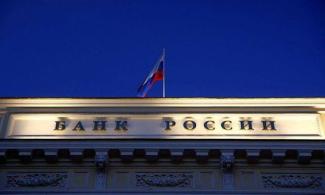
The moves by the U.S. Treasury’s Office of Foreign Assets Control will “effectively immobilize” any Russian central bank assets held in the U.S. or by U.S. nationals, according to a Treasury Department statement, Bloomberg reports.
President Joe Biden’s administration on Monday banned U.S. people and companies from doing business with the Bank of Russia, the Russian National Wealth Fund and the Ministry of Finance.
The moves by the U.S. Treasury’s Office of Foreign Assets Control will “effectively immobilize” any Russian central bank assets held in the U.S. or by U.S. nationals, according to a Treasury Department statement, Bloomberg reports.

The U.S. also announced new penalties on a key Russian sovereign wealth fund, the Russian Direct Investment Fund, and its Chief Executive Officer, Kirill Aleksandrovich Dmitriev, a close ally of Russian President Vladimir Putin.
The announcements marked the latest blow in the West’s financial retaliation against Russia following Putin’s invasion of Ukraine and are designed to shake an already staggering Russian financial system.
“The unprecedented action we are taking today will significantly limit Russia’s ability to use assets to finance its destabilizing activities and target the funds Putin and his inner circle depend on to enable his invasion of Ukraine,” Treasury Secretary Janet Yellen said in a statement.
The U.S. and EU blocks on the Russian central bank’s assets will immobilize nearly half of Putin’s war chest, according to a Treasury spokeswoman. Roughly 13% of the central bank’s reserves are held in China, she said.
Putin’s war chest is an estimated $630 billion in reserves, the officials said, and the measures are aimed at blocking his ability to sell those to mitigate financial pressure domestically.
Russia’s own data published in January shows that $100 billion of the reserves were held in U.S. dollars as of June.
The U.S. separately issued a license allowing certain energy transactions with the central bank, a carve-out a senior administration official said is aimed at minimizing the fallout in Europe and energy markets.
It will take time for Russian institutions to figure out how to segregate energy transactions from other measures, the official said.
The U.S. is continuing to work with European Union partners to finalize the list of banks that will be cut off from the SWIFT system, a second senior administration official said. The list of banks will be finalized by the EU because SWIFT is under Belgian authority.
U.S. officials are monitoring Belarus’s role in the Russian invasion, and that country will also face further consequences if it continues to aid and abet Russia, one of the officials said.
The moves came two days after the U.S., U.K., Canada and the EU said they would block major Russian banks from SWIFT, take steps to stop Russia’s central bank from rescuing the nation’s economy and move to seize Russian oligarchs’ yachts and residences in the West.
The U.K. Treasury said earlier Monday it will act immediately to stop people and companies doing business with the Bank of Russia, the Russian National Wealth Fund and the Ministry of Finance.